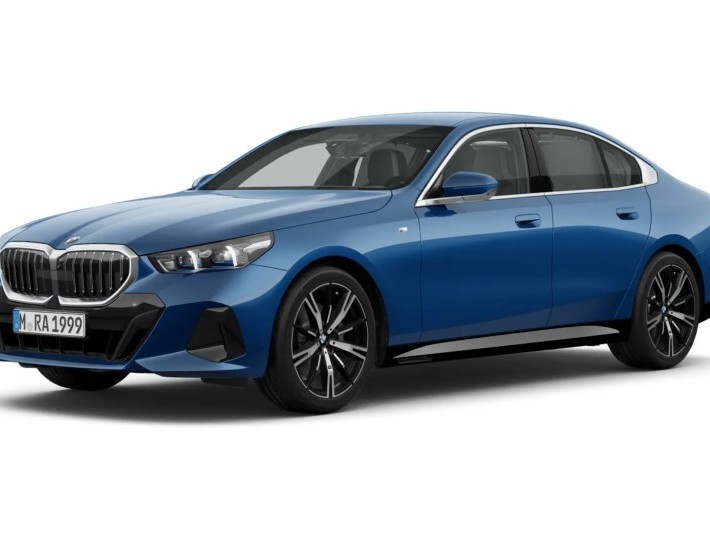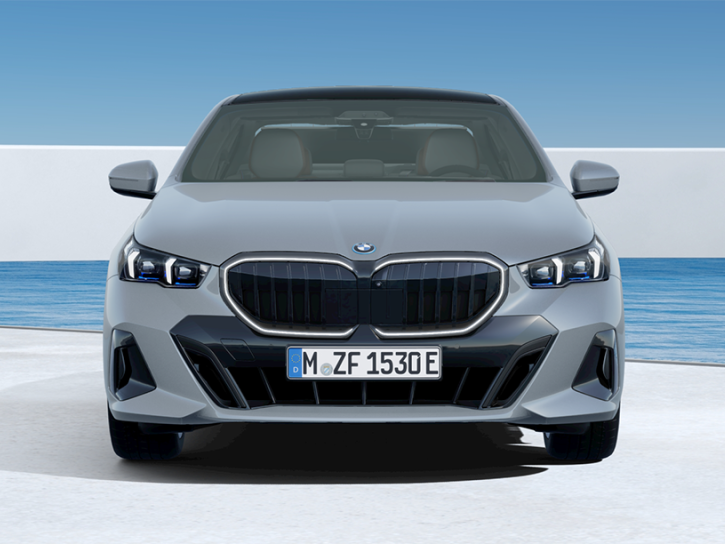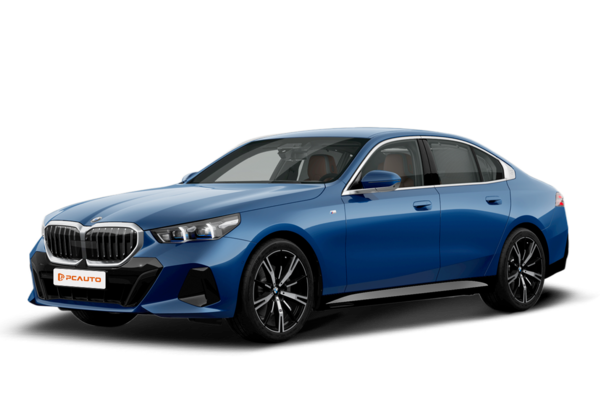Q
Does the 2025 5-series have a hybrid option?
Yeah, the 2025 5 Series does offer hybrid options, including plug-in hybrid (PHEV) models like the 530e and 545e xDrive. These bad boys pair a efficient internal combustion engine with an electric motor, delivering solid power while keeping fuel consumption low—perfect for both daily commutes and long road trips. PHEV models usually come with a larger battery pack, allowing you to drive around 50 to 60 kilometers on electric power alone. That’s super handy for short trips and helps cut down on emissions too. BMW’s always been a leader in hybrid tech; their system uses smart energy management to optimize power delivery and energy recovery, making the drive smooth and efficient. If you’re big on eco-friendliness and fuel economy, the hybrid versions are a strong pick. Plus, in some areas, you might qualify for tax breaks or subsidies when buying one, which helps lower the overall cost of ownership. On top of that, BMW has optimized charging convenience for their hybrids—they work with home chargers and public charging stations, so it’s really easy to use.
Special Disclaimer: This content is published by users and does not represent the views or position of PCauto.
Related Q&A
Q
What is the lineup of the 2025 BMW 5 Series?
The 2025 BMW 5 Series offers a diverse range of models, including gasoline, plug-in hybrid, and fully electric versions, catering to different consumer needs. The gasoline lineup is expected to include the 520i, 530i, and 540i, powered by 2.0L turbocharged four-cylinder and 3.0L turbocharged six-cylinder engines respectively, all mated to an 8-speed automatic transmission. Some trims will also come with the xDrive all-wheel-drive system. The plug-in hybrid variants, 530e and 545e, strike a balance between fuel efficiency and performance, with improved all-electric range. The fully electric i5 will be available in eDrive40 and M60 xDrive trims, with the latter boasting stronger power outputand all-wheel drive. The new 5 Series features the latest design language, with an interior equipped with a curved dual-screen setup and iDrive 8.5 system, exuding a strong tech vibe. Notably, the 5 Series has always been known for its handling and luxury, and the new model sees upgrades in chassis tuning and sound insulation, along with added driver assistance features like automatic parking and highway assist. For consumers who value driving experience and tech features, this car is definitely a solid option to consider.
Q
How much is BMW 5 Series 2025 in Dubai?
The 2025 BMW 5 Series pricing in Dubai is expected to vary depending on configuration and model. Looking at current market trends, the base model will likely start around AED 250,000 to AED 300,000 (approximately MYR 310,000 to MYR 370,000), while higher-spec versions or performance-focused models like the M550i could exceed AED 400,000 (around MYR 500,000). As a tax-free region, Dubai typically offers more competitive new car prices than many other countries, though final costs will depend on optional extras, dealer incentives, and exchange rate fluctuations.
The BMW 5 Series has long been known for its luxury, comfort, and cutting-edge tech. The 2025 model is expected to feature an updated iDrive system, more efficient hybrid options, and enhanced autonomous driving capabilities—all designed to deliver an exceptional experience whether on long highway stretches or daily city commutes. If you're considering importing or cross-comparing markets, be mindful of right-hand vs. left-hand drive differences, as well as whether warranty and after-sales services cover international use. For the most accurate budgeting, it's best to contact authorized Dubai dealerships directly for the latest quotes and detailed spec sheets.
Q
How spacious is the 2025 BMW 5 Series?
The 2025 BMW 5 Series continues the brand's tradition of luxury and comfort in terms of space. The wheelbase has been slightly increased compared to the previous generation, resulting in more generous rear legroom – even a 180cm tall passenger can easily get over two fists of knee space. Meanwhile, headroom isn't significantly compromised thanks to optimized streamlined roof design. The standard trunk volume reaches 530 liters, easily accommodating multiple golf bags or large suitcases, and the rear seats fold in a 4:2:4 split to further expand cargo capacity. Notably, this generation adds rear seat angle adjustment, catering to Asian consumer preferences and significantly enhancing long-distance ride comfort. As one of the benchmarks in mid-size luxury sedans, the 5 Series skillfully balances driving pleasure and passenger experience in its space layout. Compared to competitors, it places greater emphasis on driver-centric ergonomics, with optimized steering wheel and gear lever positions ensuring the best possible driving posture. For those needing more loading capacity, the Touring wagon version is worth considering, though it's important to note that specific configurations of locally imported models may vary due to market strategies.
Q
What is the price of BMW 5 Series 2025?
Pricing for the 2025 BMW 5 Series hasn't been officially announced yet, but looking at the current model and the pricing trends of its competitors in the same segment, we expect the starting price to be between 350,000 and 450,000 Malaysian Ringgit, depending on the configuration and powertrain options. The new generation 5 Series is expected to continue the brand's design language that blends luxury and sportiness, and will likely introduce more intelligent features, such as an upgraded driving assistance system and more advanced in-car connectivity functions. In terms of powertrains, besides the traditional fuel versions, a plug-in hybrid model is also expected to be launched simultaneously to meet the needs of different consumers. The BMW 5 Series has always been known for its excellent handling and comfort, and the new model will probably further optimize the chassis tuning and sound insulation to enhance the overall driving and riding experience. If you're interested in this car, it's recommended to keep an eye on pre-sale information from local dealers or official launch events to get the latest pricing and promotional details. At the same time, you can also compare it with models like the Mercedes-Benz E-Class or Audi A6 in the same class, considering factors such as configuration and after-sales service to choose the most suitable luxury sedan for yourself.
Q
What are the trim levels for the 2025 BMW 5 Series?
The 2025 BMW 5 Series offers multiple trim levels to meet different needs. The entry-level 520i comes with a 2.0-liter turbocharged engine and basic luxury features like a 12.3-inch digital instrument cluster and a 10.25-inch infotainment screen. Stepping up, the 530i gets a more powerful engine and the M Sport package, including exclusive exterior styling and an adaptive suspension system. The plug-in hybrid 545e xDrive combines a 3.0-liter six-cylinder engine with an electric motor, delivering around 50 kilometers of all-electric range—perfect for eco-conscious drivers who still want performance. At the top of the lineup, the M560i packs a 4.4-liter V8 twin-turbo engine, with standard all-wheel steering, laser headlights, and premium leather upholstery. Tech highlights include AR navigation and 5G connectivity. It's worth noting that BMW has stepped up its local adaptation efforts in recent years, such as optimizing cooling systems for tropical climates and offering right-hand-drive-specific driver assistance setups. All models also support DC fast charging, making public charging stations easy to use. Buyers can tailor their 5 Series with various packages: the Executive Package adds four-zone climate control and rear-seat entertainment, while the Technology Package includes more advanced autonomous driving assistance features.
Q
Is the new BMW 5 Series selling well?
The all-new BMW 5 Series is performing pretty impressively in the local market. With its iconic luxury design, advanced tech features, and efficient powertrains, it's been drawing in plenty of buyers who want both driving fun and business practicality. The new model comes with the latest iDrive 8.0 system and offers multiple powertrain options, including plug-in hybrid, catering to different user needs—especially those buyers with higher environmental performance requirements. What's more, the 5 Series' traditionally strong handling and comfort have been further refined, keeping it highly competitive in its class. It's also worth mentioning that BMW has a solid after-sales service network locally, which further boosts consumer confidence. If you're in the market for a midsize to large luxury sedan that balances luxury and practicality, the 5 Series is definitely one to consider. Rivals like the Mercedes-Benz E-Class and Audi A6 also bring their own unique strengths to the table, so it's advisable to test drive and compare based on personal preferences and needs.
Q
Will BMW prices go up in 2025?
There's no official word yet on whether BMW prices will go up in 2025, but we can look at a few key factors to gauge the likelihood. First off, global supply chain cost fluctuations—like chip shortages or changes in raw material prices—could impact new car pricing. If the economic environment stays shaky in 2025, automakers might adjust prices to handle cost pressures. Second, BMW's been ramping up its electrification push lately, and new models, especially EVs, involve higher tech investments. Prices for those could tick up a bit as configurations get upgraded. On top of that, exchange rate shifts affect import car prices too. If the Ringgit keeps weakening, import prices might get pushed up involuntarily. That said, the brand might offset some of those increases through local production or promotional tactics, like better loan deals or extended warranties. It’s a good idea to keep an eye on the brand’s annual price adjustment plans coming out in the second half of the year, and also check what’s happening with competitors in the same segment. If you’re planning to buy, watch for year-end sales or clearance events before model updates. One thing to note: luxury car prices are less affected by non-economic factors; brand value and supply-demand dynamics are the real long-term drivers of pricing.
Q
What engine is in the BMW 5 Series 2025?
The 2025 BMW 5 Series is expected to offer a range of powertrain options, including efficient 2.0-liter four-cylinder and 3.0-liter six-cylinder turbocharged engines, both paired with a 48V mild-hybrid system to boost fuel economy and power response. Meanwhile, the plug-in hybrid variant might come with a larger battery pack, potentially increasing all-electric range even further. For performance-focused buyers, the M5 model is likely to feature a 4.4-liter V8 twin-turbo engine, possibly combined with hybrid technology to balance power and environmental needs. BMW's recent innovations in engine tech include more precise fuel injection systems and optimized thermal management, which significantly enhance engine efficiency and reduce emissions. Additionally, BMW's modular platform design allows the same engine to be adapted across different models, giving consumers more personalized choices. If you're interested in specific power figures or local configurations, it's best to check the latest official info or consult a dealer for the most accurate vehicle details.
Q
What is the difference between 2025 and 2026 BMW 5 Series?
The key differences between the 2025 and 2026 BMW 5 Series will likely center around tech upgrades and equipment tweaks. The 2026 model is expected to get an updated iDrive system, possibly with enhanced connectivity features or autonomous driving aids—think upgraded parking assist or more advanced lane-keeping tech. Inside, there might be minor updates to materials or color schemes to stay on-trend. Under the hood, the 2026 5 Series could see refinements to the existing plug-in hybrid variants, boosting electric-only range or charging speeds, while gas-powered engines might get software tweaks for smoother power delivery. Externally, expect maybe one or two new wheel designs or subtle trim accents, but no major overhauls to the overall styling language. It’s worth noting BMW typically sticks to "mid-cycle refresh" and "full redesign" rhythms; if the 2025 model is already an all-new generation, changes for 2026 will be even smaller. For buyers, if cutting-edge tech is a priority, holding out for the 2026 could be worth it, but if value’s your thing, the 2025 might offer better incentives. The 5 Series has always nailed the balance between sporty handling and luxury, so whichever model year you pick, you’re in for a solid driving experience and comfort level. Ultimately, it comes down to your specific needs and budget.
Q
How much is the BMW 5 Series 2025?
Pricing details for the 2025 BMW 5 Series haven't been officially announced yet, but looking at the current model's price range and pricing trends among rival luxury sedans, we're expecting a starting price somewhere between 350,000 and 400,000 Malaysian Ringgit. Exact figures will vary depending on trim levels and powertrain options. The new model is projected to feature more efficient turbocharged engines and might even get a plug-in hybrid variant. It'll also come loaded with the latest iDrive system, advanced driver assistance features, and upgraded interior materials, all working together to boost both tech appeal and luxury vibes.
It's worth keeping in mind that the actual on-road cost of a luxury car usually includes extras like optional equipment, insurance, and taxes. So, if you're looking to buy, it's smart to check with authorized dealers for the newest promotions and financing deals.
Also, the BMW 5 Series has always been praised for striking a great balance between handling and comfort. The 2025 version will likely see further refinements in noise insulation and suspension tuning. Its main competitors are fellow German models like the Mercedes-Benz E-Class and Audi A6, so shoppers should compare them side by side based on personal preference and budget.
Popular Cars
Model Year
Car Compare
Car Photo
Latest Q&A
Q
Do spark plugs degrade over time?
Spark plugs do age gradually over time, and their performance degradation is mainly influenced by a combination of material, engine operating conditions, and usage environment. As a basic type, nickel alloy spark plugs are recommended to be inspected and replaced every 20,000 kilometers. Platinum and iridium spark plugs, due to their excellent corrosion resistance, can last 50,000 to 80,000 kilometers, while ruthenium spark plugs can even reach 150,000 kilometers. Turbocharged engines, due to their high-temperature and high-pressure environment, accelerate electrode wear, requiring the replacement interval to be shortened to about 60% of that for ordinary models. If the vehicle experiences difficulty starting in cold conditions, lacks acceleration power, or shows abnormally increased fuel consumption, it may be caused by enlarged electrode gaps or carbon deposits on the spark plug insulators, necessitating immediate inspection and repair. It is worth noting that even if the mileage threshold is not reached, spark plugs will exhibit decreased ignition efficiency due to metal oxidation after three years of installation. It is recommended to dynamically adjust the maintenance plan based on the service manual and actual vehicle conditions. Regularly using a specialized gap gauge to check the electrode gap (typically 0.7-1.1mm) and avoiding low-quality fuel can effectively extend spark plug service life.
Q
Will my car run better with new spark plugs?
Replacing spark plugs can indeed make a vehicle run more smoothly and improve overall performance. New spark plugs ensure more complete ignition, increasing fuel combustion efficiency, thereby enhancing power output and reducing fuel consumption—typically saving about 5% to 10% of fuel. Worn spark plugs can cause difficulty in starting, reduced power, and increased exhaust emissions, while new ones improve cold-start performance, reduce engine vibration, protect the three-way catalytic converter, and extend engine life.
It is recommended to determine the replacement interval based on the material: ordinary nickel alloy spark plugs should be replaced every 20,000 kilometers, platinum spark plugs approximately every 40,000 kilometers, and iridium spark plugs can last 60,000 to 80,000 kilometers. Specific intervals should be referenced from the vehicle manual. Additionally, matching the OEM heat range specification is crucial: high-compression-ratio engines require cold-type spark plugs (high heat range), while low-compression-ratio engines are suitable for hot-type spark plugs (low heat range). Incorrect selection may lead to knocking or carbon buildup.
When replacing spark plugs yourself, ensure the spark plug holes are cleaned to prevent debris from entering the cylinders, and tighten them to the specified torque—over-tightening may damage the cylinder head threads. If the vehicle exhibits symptoms like sluggish acceleration, rough idling, or abnormally high fuel consumption, the spark plug condition should be inspected promptly.
Q
What are the signs of bad spark plugs?
Spark plug malfunctions can affect vehicle performance through various obvious symptoms, mainly manifesting as difficulty starting (multiple attempts required for both hot and cold starts), abnormal engine vibration at idle and during driving, a noticeable reduction in power output, an abnormal increase in fuel consumption, and unexplained stalling while driving. The core causes of these issues include electrode carbon deposits leading to short-circuit and spark failure, improper spark plug gaps (too small limits spark intensity, too large results in insufficient voltage), insulator cracks causing leakage, or electrode detachment due to long-term electrical erosion. When the insulation resistance value of the spark plug decreases, the ignition voltage will be weakened or even completely fail. In addition, short-circuiting of high-voltage lines or erosion of platinum contacts may also cause single-cylinder or multi-cylinder misfires. It is recommended to replace spark plugs regularly every 40,000 to 60,000 kilometers, but the specific interval should refer to the vehicle manual, as material differences (such as nickel alloy for 20,000 kilometers, iridium for 60,000-80,000 kilometers) will also affect their lifespan. If excessive exhaust emissions (such as black smoke) or acceleration hesitation are detected, the spark plug condition should be checked immediately to avoid derivative problems such as three-way catalytic converter damage caused by prolonged malfunctions. During replacement, ensure debris is cleaned from the installation holes and high-voltage lines are correctly connected according to the ignition sequence to maintain cylinder balance.
Q
Can spark plugs affect gas mileage?
Spark plugs do have a significant impact on fuel economy, and their performance status is directly related to the combustion efficiency of the engine. When the spark plug electrodes are worn or carbon-fouled due to long-term use, the ignition energy will weaken, leading to incomplete combustion of the air-fuel mixture. At this point, the ECU will compensate for the power loss by increasing the fuel injection volume, and fuel consumption may rise by 15% to 20%. The spark plug gap is also a key factor; the standard gap is typically 0.8-1.1 millimeters. A gap that is too large will result in insufficient ignition voltage, while a gap that is too small will impede flame kernel propagation. Both scenarios will reduce thermal efficiency. The replacement intervals for spark plugs made of different materials vary significantly: nickel alloy spark plugs are recommended to be replaced every 30,000 kilometers, platinum ones can last up to 60,000 kilometers, and iridium spark plugs can maintain performance for 80,000-100,000 kilometers due to their higher melting point. It is worth noting that heat range matching is equally important. If a cold-type spark plug with excessive heat dissipation is used, it is prone to carbon buildup under low-temperature conditions; conversely, hot-type spark plugs may cause pre-ignition in high-temperature environments. It is recommended that vehicle owners adhere to the manufacturer's maintenance schedule and select premium spark plugs that meet the heat range specifications and carry MS 828 certification. This approach not only optimizes fuel efficiency but also extends the oxygen sensor's lifespan, achieving overall fuel cost savings of approximately 5%-8%.
Q
How do I know if my spark plugs need replacing?
To determine whether spark plugs need replacement, the following signs and criteria can be used: When a vehicle experiences difficulty starting, rough idling, weak acceleration, or an abnormal increase in fuel consumption, it may be due to aging spark plugs causing reduced ignition efficiency. During disassembly and inspection, the electrode condition should be observed; if the tip shows severe erosion, carbon buildup, or the electrode gap exceeds 0.8mm (the standard value for ordinary nickel alloy spark plugs), immediate replacement is required. Spark plugs of different materials have significantly different lifespans: nickel alloy spark plugs are recommended to be replaced every 20,000 kilometers, while platinum and iridium spark plugs can last 40,000 kilometers and 60,000-80,000 kilometers respectively. It is worth noting that prolonged short-distance driving or frequent start-stop cycles will accelerate spark plug wear, and in such cases, replacement should be performed 20% earlier than the recommended mileage. When selecting replacement parts, the original equipment manufacturer's heat range specifications must be strictly matched. Common brands such as NGK or Bosch provide vehicle-specific cross-reference tables in their product catalogs; incorrect heat ranges can lead to engine knocking or carbon buildup issues. During installation, a torque wrench should be used to tighten to the specification of 15-20N·m; over-tightening may damage the cylinder head threads, resulting in repair costs as high as 300-500 Malaysian Ringgit.
View MoreRelated News

BMW 5 Series Review: Luxury Shaped by Cutting-Edge Tech
JamesMay 7, 2025

The official price of the brand-new BMW 5-Series (G60) has been announced, 3,779,000-3,949,000 Thai Baht
Kevin WongMar 11, 2024

The all-new BMW i5 eDrive40 M Sport Pro lands in Malaysia
LienJan 16, 2026

Audi RS6 sedan version may return to compete fully with the BMW M5
WilliamNov 21, 2025

Neue Klasse platform's first mass-produced vehicle, the all-new BMW iX3 makes its debut, looks just like a concept car
LienSep 8, 2025
View More


















Pros
Cons